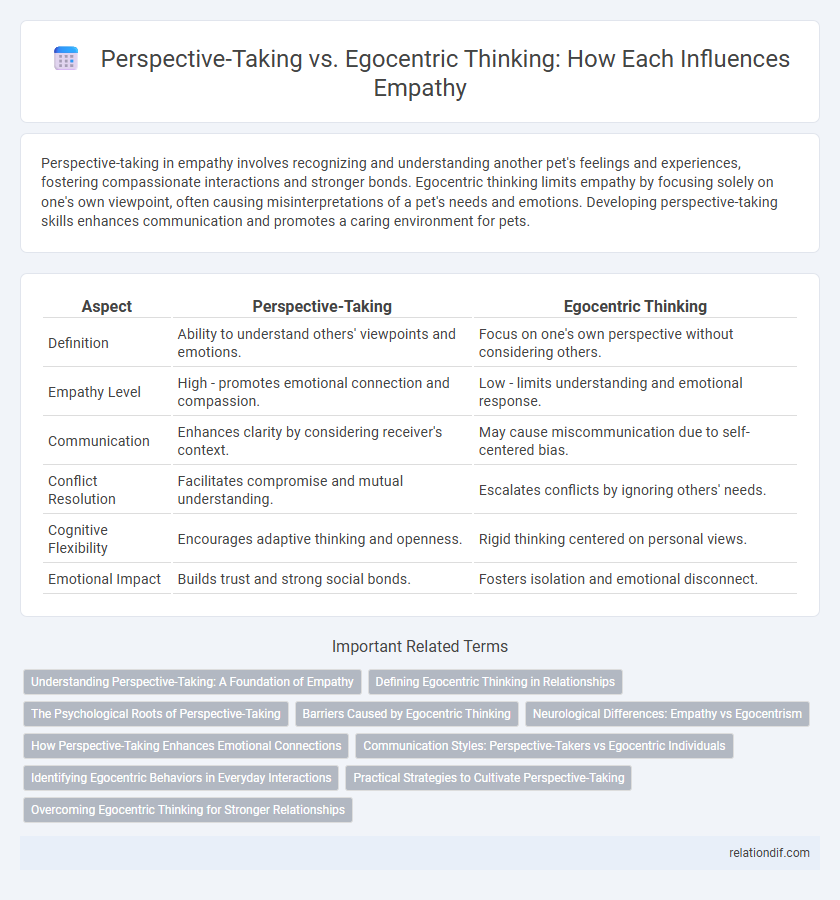Perspective-taking in empathy involves recognizing and understanding another pet's feelings and experiences, fostering compassionate interactions and stronger bonds. Egocentric thinking limits empathy by focusing solely on one's own viewpoint, often causing misinterpretations of a pet's needs and emotions. Developing perspective-taking skills enhances communication and promotes a caring environment for pets.
Table of Comparison
| Aspect | Perspective-Taking | Egocentric Thinking |
|---|---|---|
| Definition | Ability to understand others' viewpoints and emotions. | Focus on one's own perspective without considering others. |
| Empathy Level | High - promotes emotional connection and compassion. | Low - limits understanding and emotional response. |
| Communication | Enhances clarity by considering receiver's context. | May cause miscommunication due to self-centered bias. |
| Conflict Resolution | Facilitates compromise and mutual understanding. | Escalates conflicts by ignoring others' needs. |
| Cognitive Flexibility | Encourages adaptive thinking and openness. | Rigid thinking centered on personal views. |
| Emotional Impact | Builds trust and strong social bonds. | Fosters isolation and emotional disconnect. |
Understanding Perspective-Taking: A Foundation of Empathy
Perspective-taking involves cognitively adopting another person's viewpoint to understand their thoughts and emotions, serving as a fundamental pillar of empathy. It contrasts with egocentric thinking, which limits understanding by prioritizing one's own perspective over others'. Mastering perspective-taking enhances social connections, emotional intelligence, and effective communication in interpersonal relationships.
Defining Egocentric Thinking in Relationships
Egocentric thinking in relationships refers to the tendency to interpret situations and emotions primarily from one's own perspective, often disregarding the feelings and viewpoints of others. This cognitive bias can lead to misunderstandings, decreased emotional connection, and conflicts due to a lack of mutual empathy. Recognizing and addressing egocentric thinking is essential for cultivating deeper emotional bonds and improving interpersonal communication.
The Psychological Roots of Perspective-Taking
Perspective-taking originates from the brain's theory of mind capabilities, enabling individuals to infer others' thoughts and emotions beyond their own egocentric viewpoints. Neural networks involving the medial prefrontal cortex and temporoparietal junction play crucial roles in processing these social cognitive functions. This ability fosters empathy by shifting focus from self-centered thinking to a more accurate understanding of others' experiences and intentions.
Barriers Caused by Egocentric Thinking
Egocentric thinking creates significant barriers to empathy by limiting an individual's ability to see situations from others' viewpoints, often resulting in misunderstandings and conflicts. This cognitive bias causes people to interpret events primarily through their own experiences and emotions, obstructing true perspective-taking. Overcoming egocentric barriers requires conscious effort to adopt other perspectives, fostering deeper emotional connections and improved communication.
Neurological Differences: Empathy vs Egocentrism
Neurological differences between perspective-taking and egocentric thinking reveal distinct brain activations; perspective-taking engages the medial prefrontal cortex, temporoparietal junction, and posterior cingulate cortex, areas associated with understanding others' mental states. Egocentric thinking primarily activates the default mode network with heightened activity in self-referential regions, reflecting focus on one's own perspective. Functional MRI studies highlight these neural mechanisms, illustrating how empathy involves cognitive flexibility and self-other distinction, whereas egocentrism limits such processes.
How Perspective-Taking Enhances Emotional Connections
Perspective-taking enhances emotional connections by allowing individuals to step outside their own viewpoint and understand others' feelings and motivations more deeply. This cognitive shift reduces egocentric thinking, promoting empathy and fostering stronger interpersonal relationships. Research shows that individuals who practice perspective-taking exhibit increased emotional intelligence and improved conflict resolution skills.
Communication Styles: Perspective-Takers vs Egocentric Individuals
Perspective-takers employ active listening and open-ended questions, facilitating deeper understanding and collaborative dialogue, whereas egocentric individuals often dominate conversations with self-focused remarks and limited consideration of others' views. Communication styles of perspective-takers prioritize empathy, validation, and adaptability to diverse viewpoints, contrasting sharply with the rigid, self-centered expressions characteristic of egocentric thinking. This divergence in communication approaches significantly impacts relationship quality, conflict resolution, and effective interpersonal interaction.
Identifying Egocentric Behaviors in Everyday Interactions
Egocentric thinking often manifests in everyday interactions through behaviors such as interrupting others, dismissing different viewpoints, and focusing conversations solely on personal experiences. Recognizing these patterns helps improve empathy by encouraging perspective-taking, which involves actively listening and considering others' feelings and thoughts. Developing awareness of egocentric tendencies allows for more meaningful, compassionate connections in social and professional relationships.
Practical Strategies to Cultivate Perspective-Taking
Active listening exercises, role-playing scenarios, and mindfulness meditation are effective practical strategies to cultivate perspective-taking and reduce egocentric thinking. Engaging consistently in these activities enhances cognitive flexibility, allowing individuals to better understand diverse viewpoints and emotional experiences. Empirical studies show that structured empathy training increases neural connectivity in brain regions associated with theory of mind, facilitating deeper interpersonal understanding.
Overcoming Egocentric Thinking for Stronger Relationships
Overcoming egocentric thinking requires actively adopting perspective-taking, which involves understanding others' emotions, thoughts, and experiences to foster empathy. Shifting focus from personal viewpoints to the lived realities of others strengthens emotional connections and enhances communication in relationships. Consistent practice of perspective-taking reduces misunderstandings and builds trust, leading to more resilient and supportive interpersonal bonds.
Perspective-Taking vs Egocentric Thinking Infographic

 relationdif.com
relationdif.com